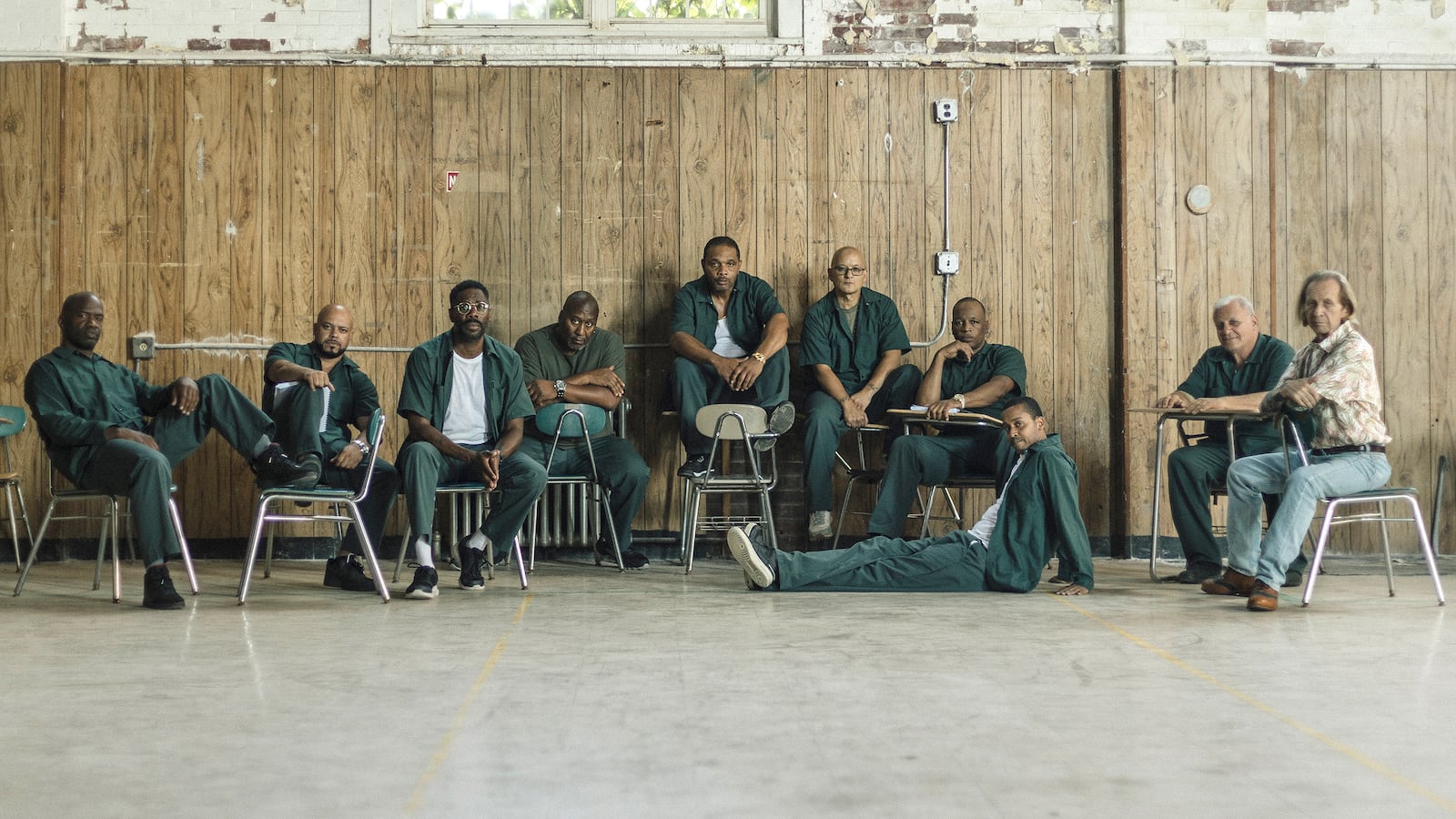Novelist and writer John “Divine G” Whitfield constantly dreamt of being in a movie.
He had a very specific idea, though. He wanted to be in a movie that centered around his time at Sing Sing Maximum Security Prison, where he and some of his fellow incarcerated men graduated from the Rehabilitation Through the Arts (RTA) program.
The program allowed incarcerated people to stage theatrical productions, including, as dramatized in the new movie Sing Sing, the troupe’s first original play, Breakin’ the Mummy’s Code: a time-traveling Shakespearean satire where the protagonist encounters pirates, Prince Hamlet, and Freddy Krueger while on a trip to Egypt.
Directed by Greg Kwedar, who co-wrote the script with Clint Bentley—both of whom previously collaborated on the acclaimed 2021 indie Jockey—Sing Sing has been hailed as one of the year’s most heartfelt films, since it first premiered at the 2023 Toronto International Film Festival. It expands to theaters nationwide this weekend.
In its review, RogerEbert.com said Sing Sing will enhance your perspective on the arts: “The more you sit with it, the more you admire everything it does and is.” The Daily Beast’s Obsessed’s review of the film praised it too: “Like the theatre group, Sing Sing the movie has the power to save—be it our hope for humanity, our love of the arts, or however else.”
Long before sharing his story with Kwedar and Bentley, Whitfield had proposed the idea of turning the RTA story into a film to his real-life director, Brent Buell, who had previously written his own script, Absolver of Sing Sing, about the experience.

(L-R) David ‘Dap’ Giraudy, Jon-Adrian ‘JJ’ Velazquez, Sean ‘Dino’ Johnson, and James ‘Big E’ Williams.
Dominic Leon/A24“I was all in for [making a film] because I always knew that we had something very special,” Whitfield told The Daily Beast’s Obsessed in a recent interview. Recognizing cinema’s built-in enormous outreach to the public, Whitfield acknowledged that the story’s themes “of rehabilitation and transformation will have a huge impact on anyone who actually had the opportunity to embrace the movie.”
The film captures the ethos that everyone in RTA lived by: “We all vowed that we [were] gonna use this as a mechanism and make sure we never come back.” Whitfield added. RTA’s philosophy is reflected in its report card, which shows that less than 3 percent of RTA alumni returned to Sing Sing—a figure that is exceedingly lower than the 60 percent U.S. national recidivism rate. Today, the Sing Sing-originated RTA program has expanded to seven additional upstate NYC correctional facilities.
Buell told Obsessed that, initially, he “was defensive” about turning his RTA experience into a film: “My brothers there are so important that I didn’t want anything that was a Hollywood thing about another prison movie.” But Buell changed his heart when he met Kwedar and Bentley, and said his “guard went down” when they reassured him of their authenticity and research in their screenplay.

Clarence ‘Divine Eye’ Maclin.
A24/A24“They gave off a vibration of goodness,” Whitfield agreed. “You can sense that these guys were genuine in making good-quality movies. When you look at what their movie style is all about, it’s about having social messages that's about empowering people.”
Trusting the “White Dudes” With the Story
Sing Sing, directed by Kwedar, follows Whitfield (played by Colman Domingo), Buell (Paul Raci), and members of RTA’s steering committee as they organize their next production. Eighty-five percent of the Sing Sing cast are formerly incarcerated individuals and RTA graduates, including Clarence “Divine Eye” Maclin, who plays himself in the film.
They act alongside the Oscar-nominated Domingo (also an executive producer) and Raci, adding to the film's authenticity regarding life in prison. Many of them were with Buell, Maclin, and Whitfield during the original run of Breakin’ the Mummy’s Code in 2005.
“It didn’t feel like work because we all had the chance to be around one another in a positive setting and create something together,” Maclin said, adding that they felt like they “escaped prison” while participating in RTA during their time at Sing Sing.
Bridging the gap between the film industry and community theater, Domingo reached out to his longtime friend Sean San José, also the artistic director of San Francisco’s The Magic Theatre and a creative executive at Domingo’s Edith Productions, to play Whitfield’s confidant and cellmate, Mike Mike. José was initially skeptical of the film, after learning that it was based on a 2005 Esquire article. His first question to Domingo about Kwedar and Bentley: “Are they white dudes?”

Greg Kwedar and Colman Domingo.
Phyllis Kwedar/A24Domingo confirmed that, yes, they were, but told José to “just read it” anyway—which made Whitfield and Buell cackle in our virtual interview.
Soon, José “took off his bullshit cap,” read the screenplay, and was astonished that it “avoided everything we expect from so-called prison movies.”
“The dehumanization that happened with our horrible prison industrial complex was all in there, but it wasn’t the story,” he said, calling Sing Sing instead a tale of men communing together and using theater to express themselves.
Digging under the surface of prison and theater, the film displays how theater is a safe space for Black and brown people to feel vulnerable. Maclin attested how the stage liberated him from other incarcerated men’s perspicacity.
Maclin said there were “grown men that I know are killers” coming up to him in the yard with tears in their eyes after watching one of the RTA productions. He feels proud that “he brought out some emotions [they] weren’t ready to show.”
Going Back to Prison, Without the Trauma
The decommissioned Downstate Correctional Facility in the Hudson Valley doubled for Sing Sing, which the crew called the film’s “room,” their term for the set. It had no working A/C, and the air was dead inside.
José praised the “alchemy” of people producers gathered, who prepared for rough shooting circumstances.
“How at ease can you be inside of a room that is inside of a dehumanizing institution? That was the whole struggle of every scene. How can you find your breath in the place that is telling you we don't want you to breathe?,” José explained.
Knowing the mental toll prison had on the RTA alums, Buell was concerned for José and Domingo's safety in group scenes that “could have gone off the rails at any point.”
Whitfield and Buell had a heavy presence in the “room.” In addition to providing guidance for their respective portrayers, the two men made cameos in the movie. Buell plays an actor whose past credit was “playing an angel at 3 years old” in the casting call scene. Whitfield appears earlier in the film as a fan of Domingo’s Divine G and asks him for an autograph. It is a sweet passing of the torch moment for these two grandiose stage commanders.

(L-R) Colman Domingo and Sean San Jose.
Dominic Leon/A24Buell said that, initially, he was "terrified” to have someone play him on screen: “I didn’t want anything to go wrong. I didn’t want to creep people out or something.” After Raci read Buell’s chapter on his time teaching at Sing Sing in Jonathan Shailor’s 2010 book, Performing New Lives: Prison Theatre, Raci told him in the “room,” “I kind of know you.” Ultimately, Buell praised Raci for his “humility” and “the ability to catch that moment and make it happen.”
Whitfield saw himself in Domingo because of his “community approach.” “He goes out of his way to make everybody in that production feel comfortable,” Whitfield said. “In anything I can do to make that experience fulfilling and helpful, Colman exhibited that.”
“He’ll be over there doing something with somebody else and I happen to glance up, and I swear that’s Divine G over there if it wasn’t Colman Domingo,” Maclin said. “He had the role down so pat.”
The Film’s “Domino Effect” Reception
Since its world premiere at TIFF 2023, Whitfield and the team have received “a domino effect of standing ovations” after several screenings. Still, detractors have spoken up as the film gains more attention and the cast’s visibility heightens, illuminating some people’s biases and skepticism of the efficacy of the RTA program.

(L-R) Sean 'Dino' Johnson, John 'Divine' Whitfield, Clarence 'Divine Eye' Maclin, Stan Shields, Jon-Adrian 'JJ' Velazquez, Beth Barrett, Greg Kwedar, Sean San Jose, and Clint Bentley attend a screening of Sing Sing at SIFF Cinema Downtown during the Seattle International Film Festival on May 18, 2024 in Seattle, Washington.
Mat Hayward/Getty Images“‘Oh, you probably got the cream of the crop, you got the good guys of Sing Sing to come in when they're already good guys,’” Buell said, giving examples of some of the criticism the premise of the rehabilitation program received. He also remembered RTA’s earlier cynics when a Sing Sing superintendent told Buell, “I hope to God you know what you’re doing. You let the most dangerous person in Sing Sing into your program.”
Nevertheless, Buell stood firm in his and the steering committee’s decisions. Whitfield stated that RTA is for those “who needed the most.”
To give the cast agency, Bentley, Kwedar, and producer Monique Walton employed an equitable financial model (the former two previously utilized it in Jockey), where everyone from the top-billed Domingo to a production assistant got paid the same hourly SAG-AFTRA rate.
“On a practical level, [it’s] incredibly empowering,” José said. His assessment of the model “is less that I walk into the room going like, ‘I own this piece of this motherfucker.’ It’s more that I walk into the room and I go, ‘These people actually care about my participation. They actually believe it in a full way.’ If you know that before you start, once you do the work, it’s like your chest is elevated because you want me in it in a full circle way.”
“Everybody in my mind is entitled to at least one shot,” Whitfield said. “I’ve been denied justice so many times… You would be surprised what we can do with a little bit of love and patience. You'’ll be amazed.”






